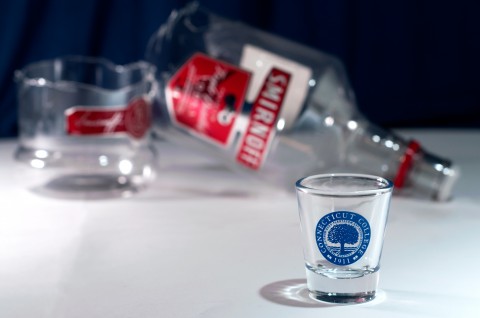 This past summer Colby College became the third NESCAC school to prohibit hard alcohol on campus. Colby was preceded by similar policies at Bowdoin College and Bates College. Colby’s ban on hard alcohol forbids the possession, consumption or provision of hard liquor by any student, regardless of age. If a student is caught in possession of hard alcohol they are immediately put on “Hard Alcohol Disciplinary Probation.” If they are discovered to have provided hard alcohol to other students on more than one occasion, they face suspension and possible expulsion.
This past summer Colby College became the third NESCAC school to prohibit hard alcohol on campus. Colby was preceded by similar policies at Bowdoin College and Bates College. Colby’s ban on hard alcohol forbids the possession, consumption or provision of hard liquor by any student, regardless of age. If a student is caught in possession of hard alcohol they are immediately put on “Hard Alcohol Disciplinary Probation.” If they are discovered to have provided hard alcohol to other students on more than one occasion, they face suspension and possible expulsion.
So why is hard alcohol being singled out? After all, a drink is a drink, whether it be a glass of wine, can of beer, vodka tonic or whisky sour. The problem is that most college students are not attending parties where hard alcohol is being served in such forms as vodka tonics and whisky sours. Rather, vodka and whiskey are being delivered in everybody’s favorite 1.5-ounce measurement: the shot.
The prospect of “going out” on a Thursday or Saturday night generally means attaining some level of intoxication and shots make it a whole lot easier to reach that goal. They also make it a whole lot easier to surpass that goal and wind up in the hospital, as was the case with the fourteen Colby students who ended up in local emergency rooms after a year-end celebration in 2008, an event which prompted the school to tighten its policy on hard liquor.
While it might be expected that Colby students would reject and resist the prohibition upon returning to campus this semester, many “realize that it is probably for the better, considering shots are the main reason why so many kids get transported to the hospital,” said one Colby student.
A committee comprising of Colby faculty, staff, alumni and students drafted the new policy, meaning the student body took part in the decision. Of course, there are students who still choose to consume hard alcohol on campus, but when they do, “it’s in their room sneakily and pretty quietly” in order to avoid getting “screwed by security,” said the same Colby student.
So, assuming Colby is aware that hard alcohol is still, at some level, being consumed on campus, what is the school hoping to achieve by prohibiting the substance?
C.C. Curtiss, Director of Student Wellness and AOD Education at Conn speculated, “After extensive evaluation, Colby instituted the ban on hard alcohol to support the mission of the college and for the health and well-being of their community. Policy change is only one aspect of environmental prevention strategies and health promotion on a college campus.”
According to Curtiss, the ideal outcome of the new policy would be a change in the culture and behavior surrounding alcohol usage.
A few years ago, Connecticut College experienced its own policy change regarding alcohol on campus in response to a change in Connecticut state law. Though the new policy is commonly thought to have placed a ban on kegs, in actuality, it simply establishes a set of procedures in order to host a social function, and defines the context in which a keg can be present.
“The policy forces students to have to clean up after themselves,” said Nathan Cornell ’11, president of SGA. As Cornell sees it, the “role of the social function policy is to put responsibility in the students hands.”
Striking a delicate balance between banning kegs altogether and emphasizing student responsibility, the policy requires that party hosts first attend a workshop called Keg 101, and that while hosting a party with a keg present, the host may not consume alcohol.
Whether Conn’s keg policy really promotes student responsibility, though, is up for debate.
“I don’t think many students who are twenty-one go to Keg 101,” said Julie Sizer ’11. “I think most of the larger parties on campus are unregistered and involve other forms of alcohol, not kegs.” For Sizer, kegs promoted socialization and an opportunity to meet people, and she believes there has been a noticeable increase in floor parties on campus due to the absence of kegs.
In his email to the student body last Thursday, President Higdon wrote, “Already this semester, several students have had to receive urgent care because they’ve had too much to drink.” Clearly the issue of student irresponsibility with alcohol is not resolved at Conn. More accountability on the part of students can prevent more strict authoritative measures— like those already taken at Colby— from being instituted at Conn.










[…] Can’t Get Hard?: Other NESCAC schools change hard alcohol policy | The College Voice […]